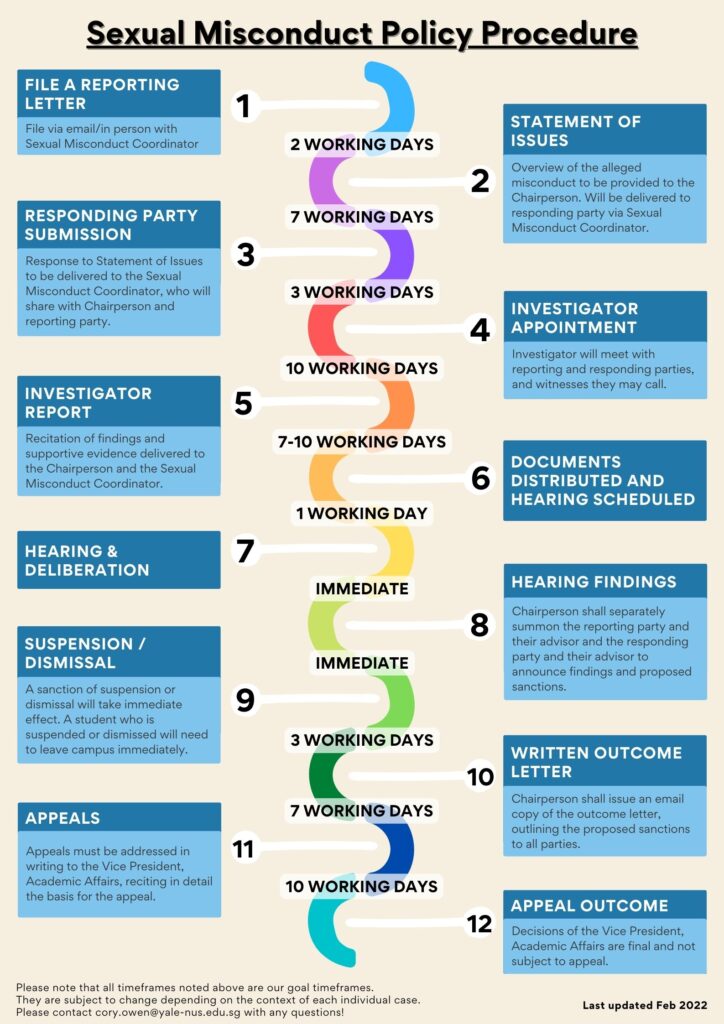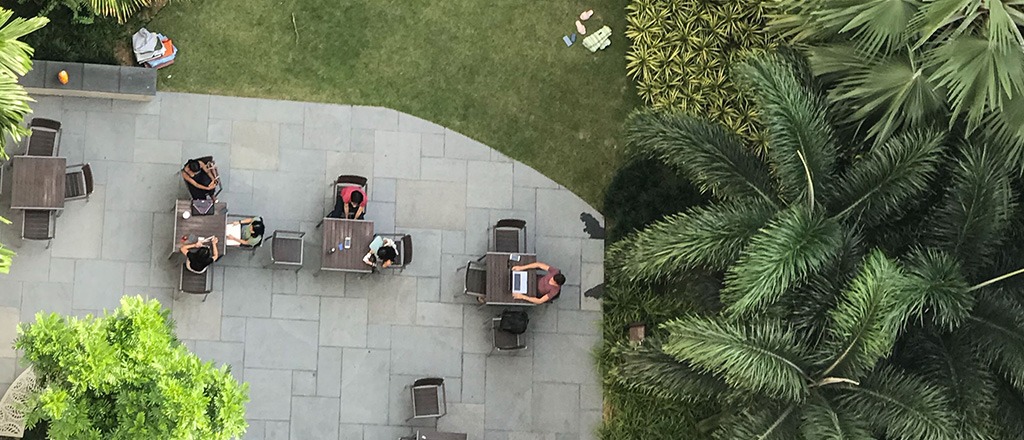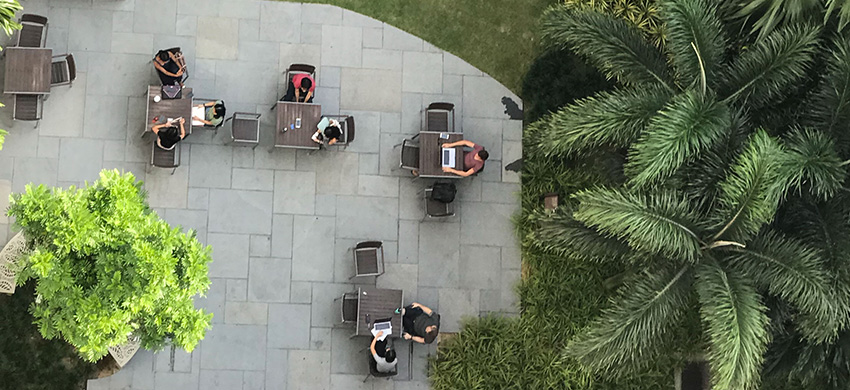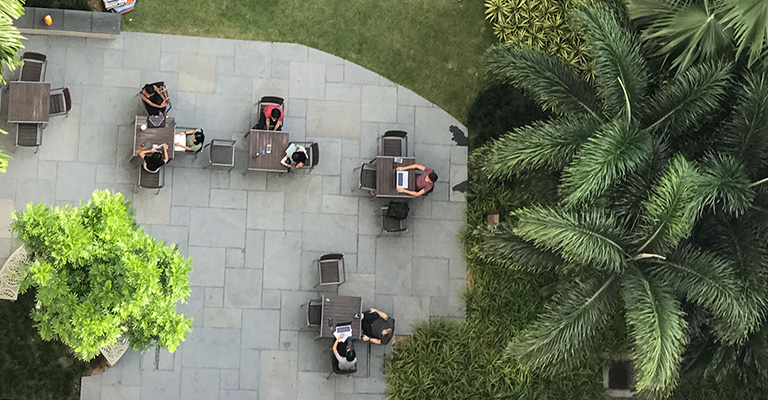Yale-NUS College aims to foster a culture of consent on campus and beyond. There are multiple avenues for resolution as well as robust structures in place to support survivors of sexual misconduct.
Sexual Misconduct Policy
Procedures for student-student cases
Sexual misconduct involves particularly sensitive issues, which require careful investigation and handling. The disciplinary procedures set out below are specifically designed to ensure that reports of sexual misconduct are investigated in a fair and objective manner, whilst protecting the privacy and interests of the students involved.
Procedures for staff/faculty-student cases
Students who wish to open a sexual misconduct case, where a Yale-NUS staff or faculty member of Yale-NUS College is the responding party, can reach out to the Student Affairs Office to submit a reporting letter. The student will be guided through the Yale-NUS Human Resources process by Cory Owen and HR staff. Any questions about this can be directed to Cory Owen (cory.owen@yale-nus.edu.sg ), Dean of Students.
Students can also make a disclosure of sexual misconduct to Human Resources (human.resources@yale-nus.edu.sg ) or Cory Owen (cory.owen@yale-nus.edu.sg ), Dean of Students. A disclosure means that a report is filed but a case is not opened. Students, who make disclosures, can choose to be informed if anyone else discloses about the same responding party. Students, who choose to make a disclosure, can request that the College open a formal case as well.
The Yale-NUS Staff/Faculty Sexual Misconduct policy also prohibits any romantic or sexual relationship between a Yale-NUS staff or faculty member and a Yale-NUS student. The policy applies to both any on-campus experience, as well as any off-campus Yale-NUS sanctioned events, trips, or excursions.
Procedures at a quick glance

Sexual Misconduct Definitions
Yale-NUS recognises that sexual misconduct can occur between individuals of any gender identity and/or sexual orientation, and does not discriminate in the provision of services and support. Sexual misconduct includes but is not limited to behaviours often referred to as sexual assault, sexual harassment, stalking, sexual exploitation, sex and/or gender discrimination, and intimate partner violence. Sexual misconduct not only creates a hostile environment that can limit a student’s ability to participate in or benefit from Yale-NUS’ programmes or activities, but it is also incompatible with the climate of respect, trust, and inquiry integral to the College community. Faculty, staff, students, and visitors are expected to contribute to an intellectual, social, and employment environment that is free of unwelcome sexual behaviours and unwanted sexual experiences. We encourage all members of the College community to report instances of sexual assault or sexual misconduct. All reports are taken seriously and will be investigated. For more information, please refer to the Sexual Misconduct Policy .
Any behaviours or actions prohibited by Singapore law are prohibited at Yale-NUS College. Consent is an informed and voluntary decision by an individual to engage in a sexual activity that must be offered knowingly and freely by that individual. Consent is given knowingly and voluntarily, and in the context of sexual conduct, the term ‘consent’ refers to an individual giving permission or agreeing to engage in sexual activity through mutually understandable words and/or actions that clearly indicate a willingness to engage freely in sexual activity. Consent is part of a mutual and on-going process, regardless of the relationship status or sexual history of the individuals involved.
- “No” means no, “maybe” means no and the absence of an answer also means no.
- Body language can be ambiguous; the best way to gain consent is to simply and clearly ask if your partner wishes to engage in the sexual activity.
- Consent to one sexual act does not imply consent to another sexual act.
- Consent to one sexual act does not imply consent to future sexual acts.
Obtaining Consent
- It is the responsibility of the initiator of the sexual activity to obtain consent. All parties in sexual activities are encouraged to communicate openly about what they do and do not want to each other.
- If the sexual interaction is mutually initiated, both parties are equally responsible for getting and giving consent.
- Consent is required for each separate sexual activity (i.e. kissing, touching, penetration). Any party has the right to give consent for specific activities and not others.
- Consent must be a free choice. A person cannot give consent if their ability to understand and give informed consent is impaired in any way.
- The ability to give consent freely may also be jeopardized if the initiator is in a position of power over the student, such as a professor, employer, or functioning in a supervisory capacity. Strict policies prohibit employees of the College from having any sexual or romantic relationship with students.
When consent is not given
- Consent cannot be considered given if:
- it results from the use or threat of physical force, intimidation, or coercion, or any other factor that would eliminate an individual’s ability to exercise their own free will to choose whether or not to have sexual contact
- the person is intoxicated or unable to understand the nature and consequence of what they are consenting to
- the person is under the influence of drugs or alcohol, is mentally impaired, is underage, or has experienced the explicit or implied use of force, coercion, threats, and/or intimidation. The legal age of consent in Singapore is 16 years old.
- A current or previous dating or sexual relationship does not constitute consent.
- Consent can always be withdrawn at any time (before or during a sexual activity), so that any further sexual activity after the withdrawal of consent constitutes sexual misconduct/assault. For example, if your partner’s initial ‘yes’ changes to a ‘no’ halfway through the activity, consent is considered withdrawn.
Alcohol and drugs
- The use of alcohol or other drugs (prescription or not) does not minimize a student’s responsibility for perpetrating sexual assault or sexual misconduct. Being under the influence of alcohol or any other drug does not excuse one from improper behaviour. The use of alcohol or drugs does not mitigate or nullify a charge of sexual assault or sexual misconduct.
Force is the use or threat of physical violence or intimidation to overcome a person’s agency to choose whether or not to participate in sexual activity. There is no requirement that a party resists the sexual advance or request, but resistance will be viewed as a clear demonstration of non-consent.
Coercion is conduct (including intimidation and expressed or implied threats of physical, psychological, or other harm) that would reasonably place a person in fear of immediate or future harm and that is employed to overcome the person’s agency and to compel the person to engage in sexual activity.
Incapacitation is a state in which an individual is mentally or physically impaired due to alcohol or drug consumption and cannot understand the nature or extent of the sexual situation. Therefore, an incapacitated individual cannot give consent.
Retaliation refers to any act or attempt to retaliate against or seek retribution from any individual or group of individuals involved or cooperating in the sexual misconduct disciplinary investigation. Retaliation can take many forms including abuse or violence, threats, and intimidation. Retaliation can occur via social media as well as through face-to-face interactions. Retaliation can come from any individual community member or group of community members, not just reporting or responding parties. Retaliation can also include contributing to a hostile environment for any parties involved which may include but is not limited to slander, sharing case files or its contents, or attempts to have others perform abuse or violence, threats, intimidation, or removal of benefits.
Yale-NUS College condemns all forms of retaliation as they intentionally seek to harm members of our community. If a person suspects retaliation is taking place, this claim will be investigated via a Community Standards hearing process. If a student is found to have engaged in retaliation, that is a breach of the Community Standards and there will be sanctions imposed on that person. Where retaliatory acts are attributable to either the reporting or responding party, they may also be taken in account for the purposes of an ongoing sexual misconduct investigation. Retaliation which is carried by either the reporting and responding party after a sexual misconduct case has been resolved may be cause to revisit the case or any sanctions imposed.
Students can also make a disclosure of sexual misconduct to the Sexual Misconduct Coordinator, Cory Owen (cory.owen@yale-nus.edu.sg ), the Dean of Students, or to a Survivor Support Advisor. A disclosure means that a report is filed but a case is not opened. Students who make disclosures can choose to be informed if anyone else discloses about the same responding party. Students who choose to make a disclosure can request that the College open a formal case as well.
Prohibited Behaviour Under the Policy
Sexual assault is the act of committing non-consensual sexual contact. Sexual contact includes, but is not limited to:
- Touching, in a sexual context or manner, another person’s breast, buttock, groin, or genitals;
- Touching, in a sexual context or manner another person using one’s own breast, buttock, groin, or genitals;
- Physically causing another person to touch themselves or another with or on the breasts, buttocks, groin or genitals; or
- Any intentional bodily contact made in a sexual manner, even though not involving contact with, of, or by the breasts, buttocks, groin, genitals, mouth or other orifice.
- Such an act is committed against a person’s will (through force, threat, manipulation, or coercion), without a person’s consent, and/or during a time in which the person is incapable of giving consent because of incapacitation, unconsciousness, or a drug-induced state. Reporting and responding parties can be of any sex/gender, sexual orientation, and/or sexual identity.
Sexual harassment is a form of sex discrimination that involves any non-consensual acts of a sexual nature. This includes but is not limited to non-consensual sexual advances, non-consensual requests for sexual favours, non-consensual sexual jokes or epithets, non-consensual sexually explicit statements, non-consensual physical contact, and any other physical or verbal conduct of a sexual nature directed at a person because of their sex and/or gender. Sexual harassment also includes harassment online and offline, including sending explicit messages, photos, videos, or other media, of a sexual nature, to a person without their consent.
Stalking is one form of sexual harassment and is defined as harassing behaviour that is unwelcome, persistent, and repeated directed toward an individual or group. Stalking may take many forms, including following, lying in wait, monitoring, and pursuing contact. Stalking can also include communicating to or about a person for the purpose of surveillance. Stalking may occur in person or through a medium of communication such as making frequent phone calls or sending frequent messages or emails, as well as by other means. Stalking can occur over a few days or for many years.
This is the sharing of private, revealing, or sexually explicit images or videos of a person, without the consent of the subject and in order to cause them distress or embarrassment. This includes images or videos that are AI-generated (deepfake). The media may be shared via posting online, texting to others, chat groups, printed, etc.
Exhibitionism involves the deliberate and unsolicited exposure of the genitals to an unwilling audience. It also encompasses engaging in sexually explicit activity in public spaces, including online.
Sex and/or gender discrimination refers to the unequal or unfair treatment of an individual based on sex or gender. Yale-NUS does not tolerate any form of discrimination, including but not limited to, discrimination based on sexual orientation, gender identity, and gender expression. For more information on College policy in this regard refer to Yale-NUS Student Community Standards .
Intimate partner violence is defined as violence in which a current or former intimate partner uses or threatens physical or sexual violence. This violence can also include physical, psychological, or emotional abuse.
Sexual exploitation occurs when a person takes non-consensual or abusive sexual advantage of another person for the benefit of anyone other than the person being exploited. This term includes behaviours that are not otherwise considered under sexual assault or sexual harassment, such as, but not limited to, non-consensual photographing or video/audio recording of sexual activity, non-consensual voyeurism, or purposefully inducing incapacitation for the intention of sexual activity. This includes allowing others to observe such conduct. Please note, this list is not exhaustive.
Quid pro quo occurs when a person in authority makes sexual demands or requests for sexual favours or dates in exchange for a benefit. A person in authority for this purpose is someone who can affect or impact the individual’s environment by leveraging their positional power.
Singapore Law
In Singapore, sexual assault carries a different definition from rape. This difference in definition impacts the consequent punishment delivered.
According to the Penal Code S354, sexual assault is defined as ‘whoever assaults or uses criminal force to any person, intending to outrage or knowing it to be likely that he will thereby outrage the modesty of that person’, will be guilty of ‘assault or use of criminal force to a person with intent to outrage modesty’. This law does not specify gender; thus, a person of any gender could be sexually assaulted.
Under S375 of the Penal Code of Singapore, rape is defined as ‘any man who penetrates the vagina of a woman with his penis without her consent, or with or without her consent, when she is under 14 years of age’. Furthermore, Section 157(d) of the Evidence Act allows a woman’s past “immoral” history to be used against her, officially codifying “blaming the victim”. This law is more gender specific; technically, men cannot be raped. Thus, a man who is penetrated by another man would NOT be considered raped under Singapore law. However, a man who is penetrated by another man without consent is a victim of unlawful sexual penetration, which carries the same penalties as rape.
Under S376A of the Penal Code of Singapore, it is illegal to have sex with a person under the age of 16. Enhanced penalties for offences against person below 14 years of age.
The jail term for all three carry a maximum of 20 years. However, the offence of rape carries a minimum of eight years while sexual assault by penetration carries no minimum. Caning is mandatory for the offence of rape with at least 12 strokes being compulsory. This is not so for sexual assault by penetration through the offender may be liable for a fine or caning.
Roles Involved
Find information about individuals who may play a part in the proceedings of sexual misconduct cases.
Addressing sexual misconduct issues on campus is part of the portfolio of the Manager, Residential Education and Dispute Resolutions, who coordinates the overall process for sexual misconduct discipline cases. Reporting parties would submit their Reporting Letter to the Coordinator in order to begin the disciplinary process. The Coordinator is also available to give any student involved in a disciplinary process information on the process, what to expect, etc. The Coordinator can also provide support for students after a case has closed. The Coordinator does not sit on the hearing panel or make decisions related to any individual case. If any student involved in case believe there is an issue with the Investigator, Chair, their advisor, and/or thinks a conflict of interest exists, or the recommended timeframes are not being followed, the student can address these issues with the Coordinator. If there is a potential issue with the Coordinator, students can approach the Dean of Students.
The Chair of the hearing panel is a Yale-NUS staff or faculty member that has been trained by the Coordinator. The Chair’s role in the hearing is to ensure smooth functioning during the hearing itself, as well as be a main liaison for distributing documents prior to the beginning of the hearing. The Chair has the discretion to decide the following during the hearing:
- What parts, if any, of the Investigator’s report are to be ignored by the hearing panel or stricken from the record
- Whether questions posted to any parties involved are relevant and appropriate; the Chair can terminate questioning at any time during any portion of the hearing
- Whether there is a need for a break in the proceedings
- Whether it is necessary to call in a specific witness (based on the Investigator’s report) who the reporting/responding parties have not called in
- Whether it is necessary to re-question any parties involved in the case
- Whether any witnesses need to be spoken to alone, without the reporting/responding parties present
- Whether new or additional information can be admitted
The Chair will be in charge of reminding all participants of the importance of confidentiality. The Chair also determines the schedule of appearances during the hearing itself and will meet separately with the reporting and responding parties and their respective advisors to explain the hearing process.
Hearing panel members will be selected from the staff and faculty at Yale-NUS College and will be trained by the Coordinator. Panel members will have access to all documents involved in the case and will be present during the hearing to ask questions of all parties involved. Panel members work with the Chair to determine if the responding party is responsible or not; if responsible, they also work collaboratively to determine the sanctions.
The Investigator is tasked with interviewing all parties involved, including witnesses, and compiling the information into a report that is submitted to the Chair. The Investigator is not involved in determining responsibility and does not assign any sanctions. All Investigators have been trained by the Coordinator and will conduct interviews in a supportive and non-biased manner. The College will appoint at least two Investigators. Investigators have the discretion to choose what they include in their report. If reporting or responding parties feel that something important was missed in the report, they are able to raise that for the hearing panel to review.
Investigators will strive to complete their interviews and write thefir report within 10 calendar days of being appointed. However, based on scheduling, complexity of the case, and the number of potential witnesses involved, this time frame may be extended. If any party involved feels too much time has elapsed, they should inform the Coordinator.
Investigators do not have the authority to compel any party to undergo psychological, health, physical, or any other such tests. An Investigators’ sole responsibility is to interview the parties involved and compile a written report. In a case in which the Investigator feels an additional expert is needed, they can make that recommendation to the Chair. Parties are not compelled to meet with Investigators or to provide specific pieces of evidence which Investigators ask for and can decline to participate in the Investigation. However, if the responding party declines, they will be taken to have admitted to the Reporting Party’s allegation of sexual misconduct and the disciplinary panel shall proceed to impose sanctions. If the reporting party declines, the case can be dropped.
There will be multiple Investigators who are trained and parties involved can share potential conflicts of interest with the Coordinator. Any parties who believe the Investigators are acting unprofessionally, asking inappropriate questions, or otherwise unable to complete their Investigation properly, should consult with the Coordinator immediately.
Both the reporting and responding parties can call witnesses to be interviewed by the Investigator and questioned at the hearing. Witnesses can be either internal or external to the College. Witnesses can decline to participate in the Investigation and decline to be present at the hearing if invited by the reporting or responding parties. The Chair, however, can also request the witness is present at the hearing if they believe the witness has information necessary to the outcome of the case. If the witness does not want to be part of the hearing at all, the Chair may suggest other accommodations (meeting one-on-one with the Chair, submitting an additional written statement, etc).
Reporting and responding parties should include witnesses that have direct knowledge of the case at hand (i.e. through seeing or hearing it first hand) or who can provide compelling secondary knowledge (i.e. texts and other communications, corroboration of conversations, etc). If witnesses are present at the hearing, the reporting and/or responding parties, respectively, can sit in the room with them; however, the Chair also has the ability to request to see the witness alone, without other parties present.
The Dean of Students is informed of outcomes of sexual misconduct cases. If a student is suspended or dismissed, the Dean of Students will work to communicate with the various campus offices that require this information, such as Registry and Infrastructure. Offices on campus will not be informed as to what policy was violated or any details of the case; rather, they are solely informed that a student is on suspension or has been dismissed. The Dean may also serve as the Chair for cases.
An advisor is a person who can provide logistical and emotional support for the reporting or responding party during the discipline proceedings. When a case is filed, both the reporting and responding parties will receive a list of advisors who have been trained. Parties can choose any staff or faculty member on campus as an advisor; however, they are encouraged to select someone who has been trained. Please note that Assistant Deans (ADs) are unable to serve as an advisor and that for any individual case, the advisor cannot be the same person for both the reporting and responding parties.
The advisor’s main role is to provide student support and they will be knowledgeable about the process of disciplinary cases. Advisors can review any documents students may want to submit and offer suggestions and ideas. Advisors can also provide emotional support for the student they are advising. If advisors are seeking information or clarification on the process itself, they should go directly to the Sexual Misconduct Coordinator.
Advisors should not interact with, question, or meet with the Chair, the Investigator, other advisor(s) on the same case, or the panel members without the presence of the student whom they are supporting. Any concerns that the advisor may have about the process should be directed to the Sexual Misconduct Coordinator. Advisors can sit in on any meetings that the students involved have with the Chair, Investigator, and/or Sexual Misconduct Coordinator. Advisors can also sit in during the hearing itself if requested by the student.
FAQ
Frequently asked questions regarding the people, procedures, outcomes, and other details regarding sexual misconduct cases.
Kingfishers for Consent
The Kingfishers for Consent is a group of students who serve as Yale-NUS College’s sexual wellness peer educators.
NUS Procedures and Additional Resources
Yale-NUS students who experience any kind of sexual misconduct from National University of Singapore (NUS)’s staff, faculty, or students can be supported in making a report to NUS. Yale-NUS staff, including Student Affairs Office staff, can support a student through these processes, as well as be present for any meetings they may have with NUS.
Yale-NUS staff will connect students with the Victim Care Unit (vcu_admin@nus.edu.sg) and the Office of Campus Security at NUS. Students with questions about the process when a member of the NUS community is the responding party in a case can direct them to Student Affairs Office (studentaffairs@yale-nus.edu.sg).




